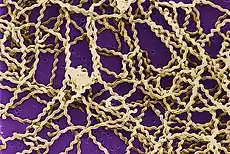Leptospira
Leptospiras are long, thin motile spirochaetes. They may be free-living or parasitic. They survive well in fresh water, soil, and mud in tropical areas. They have been studied at the CDC (Centers for Disease Control and Prevention).
| Leptospira | |
|---|---|
 | |
| Scanning electron micrograph of Leptospira interrogans. | |
| Scientific classification | |
| Domain: | |
| Phylum: | Spirochaetes |
| Class: | Spirochaetes |
| Order: | Leptospirales |
| Family: | |
| Genus: | Leptospira Noguchi 1917 emend. Faine & Stallman 1982 non Swainson 1840 non Boucot, Johnson & Staton 1964 |
| Species | |
| |
| Synonyms | |
| |

This scanning electron micrograph (SEM) shows Leptospira sp. bacteria on a polycarbonate filter
Molecular taxonomic studies at CDC and elsewhere have identified 13 named and 4 unnamed species of pathogenic leptospires. Leptospirosis causes a wide range of symptoms, and some infected persons may have no symptoms at all. Symptoms of leptospirosis include high fever, severe headache, chills, muscle aches, and vomiting, and may include jaundice (yellow skin and eyes), red eyes, abdominal pain, diarrhea, or a rash.
This article is issued from Wikipedia. The text is licensed under Creative Commons - Attribution - Sharealike. Additional terms may apply for the media files.